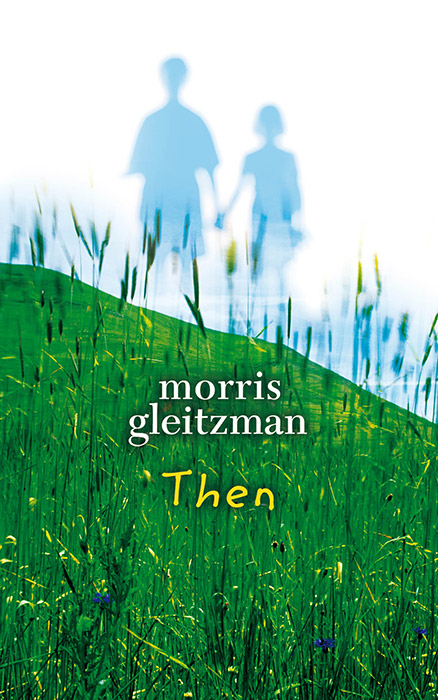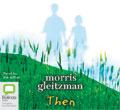Listen to Morris read Chapter 1

Chapter 1
Then we ran for our lives, me and Zelda, up a hillside as fast as we could.
Which wasn’t very fast.
Not even with me holding Zelda’s hand and helping her up the slope.
You know how when you and two friends jump off a train that’s going to a Nazi death camp and you nearly knock yourself unconscious but you manage not to and your glasses don’t even get broken but your friend Chaya isn’t so lucky and she gets killed so you bury her under some ferns and wild flowers which takes a lot of strength and you haven’t got much energy left for running and climbing?
That’s how it is now for me and Zelda.
‘My legs hurt,’ says Zelda.
Poor thing. She’s only six. Her legs aren’t very big. And she’s wearing bedtime slippers which aren’t very good for scrambling up a steep hill covered with prickly grass.
But we can’t slow down.
We have to get away before another Nazi train comes along with machine guns on the roof.
I glance over my shoulder.
At the bottom of the hill, the railway track is gleaming in the sun like the shiny bits on a Nazi officer’s uniform.
I peer up the slope.
At the top is a thick forest. When we get up there we’ll be safe. We’ll be hidden. The next Nazi train won’t be able to see us as long as Zelda doesn’t yell rude things at them.
If we can get up there.
‘Come on,’ I say to Zelda. ‘Keep going. We mustn’t stop.’
‘I’m not stopping,’ says Zelda indignantly. ‘Don’t you know anything?’
I know why Zelda’s cross. She thinks I’m lucky.
I am. I’m ten. I’ve got strong legs and strong boots. But I wish my legs were stronger. If I was twelve I could carry Zelda on my back.
‘Ow,’ she says, slipping and bashing her knee.
Gently I pull her up.
‘Are you OK?’ I say.
‘No,’ she says as we hurry on. ‘This hill is an idiot.’
I smile, but not for long.
Suddenly I hear the worst sound in the world. The rumble of another train in the distance, getting closer.
I peer up the slope again.
The forest is too far. We won’t get there in time. If the Nazis see us on this hillside we’ll be easy targets. My shirt’s got rips in it that are flapping all over the place. Zelda’s dress is lots of colours but not camouflage ones.
The train is getting very close.
‘Lie flat,’ I say, pulling Zelda down onto the grass.
‘You said we mustn’t stop,’ she says.
‘I know,’ I say. ‘But now we mustn’t move.’
‘I’m not moving,’ says Zelda. ‘See?’
We’re lying on our tummies, completely still except for a bit of panting. Zelda is clinging on to me. Her face is hot against my cheek. Her hands are gripping my arm. I can see that one of her fingernails is bleeding from pulling up ferns for Chaya.
The noise of the train is very loud now. Any second it’ll be coming round the bend below us. I wish we had ferns to hide under. Near us is a rabbit hole. I wish me and Zelda were rabbits. We could crouch deep in the hillside and eat carrots.
But we’re not, we’re humans.
The Nazi train screeches round the bend.
Zelda grips me even tighter.
‘Felix,’ she says. ‘If we get shot, I hope we get shot together.’
I feel the same. I squeeze her hand. Not too tight because of her fingernail.
I wish we were living in ancient times when machine guns were really primitive. When you’d be lucky to hit a mountain with one even up close. Instead of in 1942 when machine guns are so supermodern they can smash about a thousand bullets into an escaping kid even from the top of a speeding train.
Below us the Nazi train is clattering like a thousand machine guns.
I put my arm round Zelda and pray to Richmal Crompton to keep us safe.
‘Zelda isn’t Jewish,’ I tell Richmal Crompton silently. ‘But she still needs protection because Nazis sometimes kill Catholic kids too. Specially Catholic kids who are a bit headstrong and cheeky.’
Richmal Crompton isn’t holy or anything, but she’s a really good storywriter and in her books she keeps William and Violet Elizabeth and the other children safe even when they’re being extremely headstrong and cheeky.
My prayer works.
No bullets smash into our bodies.
‘Thank you,’ I say silently to Richmal Crompton.
Down the hill I see the train disappearing round the next bend. I can tell it’s another death camp train full of Jewish people. It’s got the same carriages our train had, the ones that look like big wooden boxes nailed shut.
On the roof of the last carriage there’s a machine gun, but the two Nazi soldiers sitting behind it are busy eating.
‘Come on,’ I say to Zelda as soon as the train is out of sight.
We get to our feet. At the top of the hill the forest waits for us, cool and dark and safe.
I don’t know how long till the next train, so we have to move fast. We might not be so lucky with the next one. The Nazi machine gun soldiers might not be having an early dinner.
I grab Zelda’s hand and we start scrambling up the slope again.
Zelda trips on a rabbit hole and almost falls. I save her but accidentally almost yank her arm out of its socket.
‘Sorry,’ I say.
‘It’s not your fault,’ says Zelda. ‘It’s the rabbits’ fault. Don’t you know anything?’
She lets go of my hand and holds her shoulder and her dark eyes fill with tears.
I put my arms round her.
I know her shoulder isn’t the only reason she’s crying. It’s also because of what’s happened to our parents and our friends. And because the most powerful army in the history of the world is trying to kill us.
If I start thinking about all this I’ll end up crying myself.
Which is not good. People who are crying can’t climb hillsides very fast. I’ve seen it happen.
I try to think of a way to cheer us both up.
‘In the next valley there might be a house,’ I say. ‘With a really kind cook. Who’s made too much dinner and who’s looking for people to help eat the extra platefuls of delicious stew.’
‘Not stew,’ says Zelda. ‘Sausages.’
‘OK,’ I say. ‘And boiled eggs.’
‘And marmalade,’ says Zelda. ‘On bread fingers.’
It’s working. Zelda has stopped crying. Now she’s pulling me up the hill.
‘And bananas,’ I say.
‘What’s bananas?’ says Zelda.
While we climb I tell her about all the exotic fruit I’ve read about in stories. That’s another way I’m lucky. I grew up in a bookshop. Zelda didn’t, but she’s still got a really good imagination. By the time we get to the top of the hill, she’s fairly certain the cook has got mangoes and oranges for us as well.
We plunge into the forest and hurry through the thick undergrowth. It feels really good to be in here with the ferns and bushes and trees sheltering us. Specially when I suddenly hear a scary sound in the distance.
Machine guns.
We stop and listen.
‘Must be another train,’ I say.
We look at each other. The machine guns go on and on, not close but still terrifying.
I don’t say anything about train people trying to escape, in case they’re getting shot dead. There’s only so much getting shot dead a little kid like Zelda can take.
‘Do you want to rest?’ I say to her.
What I actually mean is does she want to hide, but I don’t say that either because I don’t want her to feel even more scared.
‘No,’ says Zelda, pushing ahead. ‘I want my dinner.’
I know how she feels. Better to get further away from the railway line. Plus it’s almost evening and we haven’t eaten all day.
I follow her.
At last the distant shooting stops.
‘The house is this way,’ says Zelda, scrambling through a tangle of creepers.
That’s the good thing with stories. There’s always a chance they can come true. Poland is a big country. It’s got a lot of Nazis in it, but it’s also got a lot of forests. And a lot of houses. And quite a few sausages.
‘Has the cook got chocolate?’ says Zelda after a while.
‘Maybe,’ I say. ‘If we think about it really hard.’
Zelda screws up her forehead as we hurry on.
By the time we get to the other side of the forest, I’m pretty sure the cook has got chocolate, a big bar of it.
We pause at the edge of the trees and squint down into the next valley. My glasses are smudged. I take them off and polish them on my shirt.
Zelda gives a terrified squeak, and grabs me and points.
I put my glasses back on and peer down at what she’s seen.
Zelda isn’t pointing at a distant house belonging to a kind cook, because there aren’t any houses. She’s pointing at something much closer.
A big hole in the hillside. A sort of pit, with piles of freshly dug earth next to it. Lying in the hole, tangled up together, are children. Lots of them. All different ages. Some older than me, some even younger than Zelda.
‘What are those children doing?’ says Zelda in a worried voice.
‘I don’t know,’ I say.
I’m feeling worried too.
They look like Jewish children. I can tell because they’re all wearing white armbands with a blue blob that I’m pretty sure is a Jewish star.
Trembling, I give my glasses another clean.
‘This wasn’t in your story,’ whispers Zelda.
She’s right, it wasn’t.
The children aren’t moving.
They’re dead.
That’s the bad thing with stories. Sometimes they don’t come true and sometimes what happens instead is even worse than you can imagine.
I try to stop Zelda seeing the blood.
Too late.
She’s staring, mouth open, eyes wide.
I go to put my hand over her mouth in case she makes a noise and the killers are still around.
Too late.
She starts sobbing loudly.
Directly below us on the hillside, several Nazi soldiers jump to their feet in the long grass. They glare up the hill towards us. They throw away their cigarettes and shout at us.
I know I should get Zelda back into the undergrowth, out of sight, but I can’t move.
My legs are in shock.
The Nazi soldiers pick up their machine guns.
 Then is available in bookshops and libraries in Australia, New Zealand, the UK, the USA, and online:
Then is available in bookshops and libraries in Australia, New Zealand, the UK, the USA, and online:
 The audio track on this page is an excerpt from the Bolinda Audiobook Then, read by Morris Gleitzman.
The audio track on this page is an excerpt from the Bolinda Audiobook Then, read by Morris Gleitzman.
Buy it on CD from Bolinda (or from Amazon in the USA):
… or download as an audio file. Just search for Morris Gleitzman on Audible or the iTunes Store.




